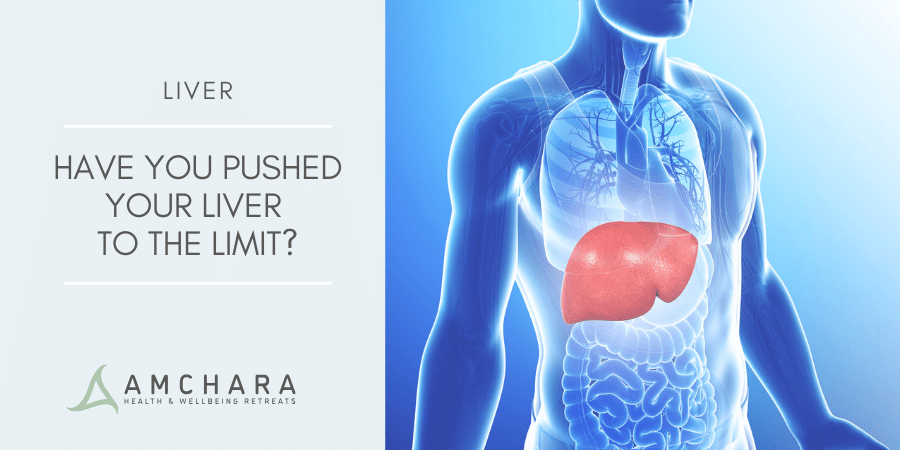Like most people you probably make frequent visits to the hairdresser, schedule regular appointments at the dentist, spend hours in the gym and religiously apply moisturising cream to your face every day.
On the surface you may be pretty well looked after…
But the question is – are you paying enough attention to what’s going on inside of you? Your liver for example – is one of the hardest working organs in your body and yet most people hardly give it a second thought.
Looking after your liver should be high on your list of self-preservation pastimes! It’s a remarkable organ performing an amazing array of functions – over 500 in fact.
The liver is one of the largest internal organs you have and makes many of the chemicals required by the body to function normally.
Its primary function is to detoxify drugs, chemicals, waste products and alcohol, but it also stores vitamins and minerals and produces antioxidants and proteins.
As an organ that is also responsible for storing glycogen – the primary source of blood glucose used by the rest of the body for fuel; anything that affects the liver’s ability to function will seriously deplete your energy levels.
In fact, fatigue is the most commonly encountered symptom in patients with liver disease.
The liver has an amazing capacity to regenerate itself but can be seriously impaired by sustained damage.
According to statistics liver disease is one of the top 5 causes of premature deaths in this country after heart, cancer, stroke and respiratory disease and alarmingly twice as many people now die from the liver disease as in 1991.
Furthermore, as a major cause of death, liver disease is the only fatality that continues to increase year on year.
One of the biggest culprits for liver disease is excessive alcohol consumption which can lead to fatty liver, alcoholic hepatitis or cirrhosis.
Alcohol misuse is estimated to cost the NHS around £2.7 billion each year.
Fortunately, damage to the liver that causes these life-threatening conditions can be prevented by avoiding alcohol or restricting the amount you consume.
Related Story: 19 Liver Friendly Foods & Herbs To Cleanse Your Liver
So how much is too much?
More than a third of men and over a quarter of women regularly exceed the recommended level of alcohol intake. The government guidelines recommend that:
- Men drink no more than 3-4 units per day. This equates to not much more than a pint of strong lager
- Women drink no more than 2-3 units a day, that’s no more than a standard 175ml glass of wine
Some of you may be happily glugging back quite a bit more than this on a daily basis not realizing that in the long term you could be seriously damaging your liver, not to mention piling on the pounds. One average bottle of wine contains around 644 calories.
An evening tipple whilst cooking the dinner or relaxing in front of the TV can be a hard habit to kick, but the benefits are well worth it.
Your energy levels increase, mood lifts and your sleep and brain function improves. You may even find your skin looks healthier and you lose a few pounds into the bargain!
The beginning of the year is as good a time as any to knock this bad habit on the head. Try some other ways to relax and wind down:
- Read a book or write a letter
- Go for a walk or a bike ride
- Sell your unwanted stuff on EBay
- Experiment with cooking
- Practice a new yoga position
- Take up a new sport
- Relax in a long hot bath
- phone up old friends and catch up
- Take up knitting or painting
Supporting your liver with a well-balanced diet is important too – fruits and vegetables are a rich source of antioxidants needed to protect the liver, so be sure to include plenty in your diet, particularly artichoke, broccoli, garlic, beetroot, leeks, berries and onions.
These should be organic if possible to avoid pesticides.
A supplement that includes a blend of liver protective herbs such as milk thistle and reishi coupled with dandelion root, artichoke leaf, and turmeric can also increase liver function and support an over-worked liver.
It takes about 2 to 3 months to properly cleanse the liver after which time you can gradually stop taking supplements but continue to focus on liver supportive foods.
If you live in the UK and need support to stop drinking call the NHS Drink line for confidential advice: 0300 123 1110.
Vitamin E can help reduce symptoms of liver disease by preventing cell damage, say researchers.
Recommended Reading:
- https://www.nhs.uk/conditions/liver-disease/
- https://www.britishlivertrust.org.uk/liver-information/living-with-liver-disease/
- https://www.nice.org.uk/guidance/qs152
References
- Bishayee A, Háznagy-Radnai E, MbimbaT, Sipos P, Morazzoni P, Darvesh AS, BhatiaD, Hohmann J. Anthocyanin-rich blackcurrant extract suppresses the growth of human hepatocellular carcinoma cells. Nat Prod Commun.2010;5(10):1613-8.
- British Liver Trust. Facts about liver disease.ww.britishlivertrust.org.uk/about-us/media-centre/facts-about-liver-disease/ [accessed 5.1.18.]
- Das SK, Vasudevan DM. Protective effects of silymarin,a milkthistle(Silybiummarianum) derivative onethanol-induced oxidative stress in liver. Indian J Biochem Biophys. 2006;43(5):306-11.
- Kujawska M, Ignatowicz E, Murias M, Ewertowska M, Miko_ajczykK,Jodynis-LiebertJ. Protective effect of red beetroot against carbontetrachloride and N-nitrosodiethylamine-induced oxidative stress in rats.J Agric Food Chem.2009;57(6):2570-5.
- Liska D, Lyon M, Jones DS (2006). Detoxification and Bio tranformational Imbalances. In: Jones DS (Ed) Textbook of functional Medicine. Gig Harbor:WA. Institute of Functional Medicine.
- Munday R, Munday CM. Induction of phaseII enzymes by aliphatic sulphides derived from garlic and onions:an overview. Methods Enzymol.2004;382:449-56
- Shukla Y,Kalra N, Katiyar S, Siddiqui IA, Arora A. Chemopreventive effect of indole-3-carbinol on induction of pre neoplastic altered hepatic foci. Nutr Cancer.2004;50(2):214-20.
- Swain MG. Fatigue in liver disease: Pathophysiology and clinical management. Canadian Journal of Gastroenterology. 2006; 20(3):181-188.





